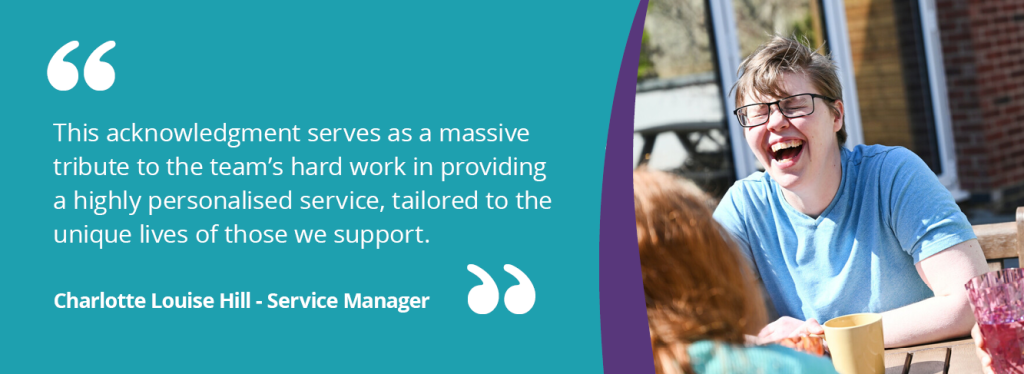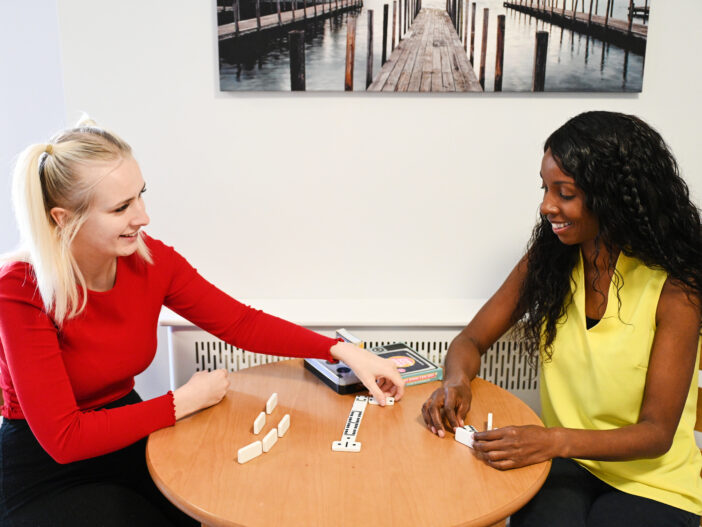National Autistic Society re-accreditation success for Titchfield Lodge!
We’re proud to announce that our residential care home, Titchfield Lodge, has successfully achieved its National Autistic Society (NAS) re-accreditation!
Located in Hampshire, Titchfield Lodge is a small home providing support for four adults with autism, learning disabilities and additional complex needs.
After receiving their first NAS accreditation in 2019, the Titchfield Lodge team have continued to go above and beyond for the people we support – resulting in re-accreditation and a truly outstanding report from the NAS inspector!
We caught up with Service Manager Charlotte, to get the lowdown on their latest accreditation and what it means to the service.
What did your journey to your NAS re-accreditation involve?
Achieving our National Autistic Society re-accreditation was no small feat! It involved an in-depth assessment of the service and its alignment with NAS standards.
Before the assessment, we were tasked with completing a lengthy manual on the service, and how we achieve NAS objectives. We also carried out a Manager’s audit which evidenced that Titchfield Lodge meets the standards expected from a service providing dedicated autism support.
The assessment was then broken down into two days of review by the NAS.
Day one involved an NAS assessor visiting the service, spending time with both colleagues and the people we support.
This was followed by a second day of virtual colleague interviews to evaluate skills, knowledge, and performance in providing autism support.
How did you prepare for the NAS re-accreditation assessment?
Regular team meetings played a crucial role in us preparing for the re-accreditation. During these meetings our discussions revolved around the autism accreditation process, planning activities, and ensuring the whole team was aware of what to expect.
Despite the pressures of being observed by an assessor, every colleague at Titchfield Lodge maintained their standard daily procedures, showcasing their commitment to providing quality care consistently.
For our team, it was treated as any other day. We didn’t feel the need to do anything differently simply because we were being assessed! Every day we’re committed to delivering the best possible care to the people we support… and we wanted to let this shine through in our assessment.
Have you implemented anything new since your last accreditation?

Since achieving our initial NAS accreditation, we’ve implemented significant changes to Titchfield Lodge to enhance the support we provide.
Across the service, we’ve focused on adapting our home to the unique needs of the people we support.
This involved considering factors beyond their learning disabilities and autism, and investigating their overall health needs further to allow us to tailor the care we deliver.
Initially, when I joined the service, I recognised certain behaviours as signs of stress.
On review of their health due to observed behaviours, a couple of the people we support were shown to have sight loss. For them, their presentation of behaviour was largely attributed to this broader health issue.
Once we addressed this and made the necessary changes to our home, there was a remarkable shift in their behaviour. The people we support became different individuals, engaging more effectively, participating in activities, and finding more enjoyment.
This positive change also led to a better rapport with our team. Given the challenges of fluctuating vision, our approach had to adapt across various aspects of their lives.
As a service, we take pride in paying attention to small details.
We actively observe to identify areas for improvement, embracing change in even the smallest areas that others might overlook. This commitment extends to our overall approach, reflecting our dedication to providing exceptional care.
Creating adapted sensory environments

As part of adapting our home to provide a better sensory experience for the people we support, we upgraded all the lighting to improve overall illumination. This involved replacing spotlights with brighter fluorescent lighting.
What might seem like a small change has had such a huge impact. It has significantly increased the brightness of our home, ensuring light is evenly distributed throughout the rooms.
Our previous décor, which was dark purple and grey, also underwent a transformation to clean, crisp colours, such as white, baby blue, and pale greens. This created a brighter environment that was more visually pleasing and easier for our residents to enjoy.
To address stress triggers, we removed long curtains from a doorway at the top of the stairs. These were replaced with privacy film adorned with colourful birds, allowing natural light into the hallway.
In another instance, frustration with canvas wall art led to property damage. We replaced this with wall stickers, not only preventing distress but also creating visually appealing displays.
The first-floor display features birds, while the ground floor showcases flowers, providing a beneficial and enjoyable environment for all.
The addition of a sensory area, featuring blackout curtains for flexible lighting, projectors, and sensory equipment, caters to both autism and visual impairment needs, offering bright and stimulating experiences.
We also use a ‘magic table’ which projects sensory scenes onto various services. These scenes include everything from beautiful woodlands with the sound of trickling streams, to an interactive display of bubbles which, when touched, pop into multi-coloured bursts across the screen. It’s a fantastic tool, and well-loved by our team and the people we support alike!
These subtle changes have enabled the individuals we support to engage more appropriately in daily life, deriving greater enjoyment from their surroundings.
Our residents are not only benefiting from these environmental enhancements but are actively engaging with and receiving positive feedback from their surroundings. And of course, all of this means that Titchfield Lodge has truly become a place to call home.
What part of the National Autistic Society re-accreditation report are you most proud of?
My highlight from the report was: “The service should now work on further developing and embedding the good practice highlighted in the report as it has the potential to become an exemplar service for autistic people who are visually impaired.”
This aspect particularly resonated with me, as I emphasised throughout the assessment process that these individuals are not significantly impacted by their autism. They do not require predictability or routine structure; but rather, their lives are more profoundly influenced by their visual impairments and sensory needs.
The assessor also acknowledged that the people we support don’t neatly fit into predefined categories. They asked about what I believed was more profound for them— their autism, their learning disability, or their visual impairment.
We asserted that their learning disability has a more significant impact on their cognition, influencing how we meet and recognise their needs, closely followed by their visual struggles.
Our approach is completely holistic. It revolves around understanding how our residents prefer to live their lives, considering the full scope of their needs and preferences, rather than just focusing on their autism.
What does it mean to receive National Autistic Society re-accreditation?

Receiving recognition for the team’s daily efforts is truly rewarding. As I listened to their interviews, their comprehensive understanding and knowledge of the individuals we support, alongside their skills at bringing out the best in them, was so clear.
The challenges we face daily are significant, especially when dealing with adults who face difficulty in communicating their preferences, wishes, and desires. But our work involves a constant process of observation, interpretation, and weighing different options.
The team is truly dedicated to exploring best practices and continuously learning from one another.
This acknowledgment serves as a massive tribute to the team’s hard work in providing a highly personalised service, tailored to the unique lives of those we support.
Do you have any tips for those looking to gain an National Autistic Society accreditation?
I’ve discovered that a significant aspect is examining the home environment.
This involves a detailed assessment of personalisation and effective use of the surroundings to encourage the best from the people we support. It’s about creating spaces that provide diverse opportunities and various forms of stimulation.
Also, ensuring that everyone has their own designated space is crucial.
Utilise communal areas thoughtfully to offer individuals some personal time. For instance, enabling independent use of the sensory room is key, while also providing a collective environment where everyone can equally engage.
The focus is on optimising the home environment, channelling efforts into making the most of the space available. This includes actively bringing people together and extracting the full potential from each element of the home.
What’s next for Titchfield Lodge?
Looking forward, our focus is on further enhancing the home environment, especially considering the realistic anticipation of sight decline for several of the people we support.
Our plan includes maximising the use of our large outdoor space by introducing a mud garden next year. This adaptation will help ensure individuals continue to gain fantastic sensory benefits from their surroundings.
Find out more about our dedicated autism support
If you’d like to learn more about how we can support you, a loved one, or a client to live their best lives, complete our quick and easy enquiry form and a member of our team will be in touch!

 Quality & sector
Quality & sector 

